
Equitable Healthcare: Medical graduates from impoverished backgrounds can bring a new perspective, says Tessa C. Griffin
In a heartfelt reflection published in JAMA Online First, Tessa C. Griffin, a medical student at the University of Wisconsin School of Medicine and Public Health, shares a deeply personal journey of overcoming poverty to pursue a career in medicine. Griffin's story sheds light on the challenges faced by individuals from low-income backgrounds and advocates for increased representation in the medical field for equitable access to healthcare.
Griffin's narrative begins with her acceptance into medical school, a moment of relief after a decade of aspiring to be a physician while living in poverty. Recounting her father's hospitalisation due to a myocardial infarction, Griffin exposes the financial strain that a health crisis can impose on families like hers, creating a lasting mistrust of medical institutions.
Undeterred by financial hardships, Griffin engaged in a programme at a local hospital, gaining firsthand experience in the medical field. She worked multiple jobs, from emergency department liaison to operating room assistant, all while scrubbing dishes at a diner and selling cigarettes in her community. Despite the challenges, Griffin's determination drove her to pursue a career in medicine.
Entering medical school, Griffin was surprised to discover the scarcity of peers from low-income backgrounds. In a field where privilege often prevails, she emphasises the need for more representation of low-income individuals in medicine. Griffin challenges the misconception that poverty stems from laziness, highlighting its systemic and complex nature.
Griffin advocates for increased support for low-income medical students, calling for mentoring programmes, holistic admission reviews, and financial aid. She stresses the importance of integrating public health into medical school curricula and creating affinity groups for emotional support in the privileged environment of medical education.
The article urges medical schools to prioritise transparent discourse on the topic, provide visible role models, and invest in underserved communities. Griffin emphasises the significance of understanding the hardships faced by patients and advocating for a healthcare system where physicians can signal empathy and understanding to patients who have experienced similar struggles.
In sharing a personal anecdote of a doctor who treated her with compassion despite a delay in seeking medical attention, Griffin underscores the need for more low-income physicians who can connect with patients on a deeper level. She hopes to become one of these physicians, bridging the gap between healthcare providers and patients who have faced financial challenges.
Tessa C. Griffin's narrative serves as a powerful call to action, urging the medical community to address the disparities in the field and work towards a more inclusive and equitable healthcare system. Her story resonates as a testament to resilience and determination, emphasising the transformative impact of individuals from diverse socio-economic backgrounds in the medical profession.